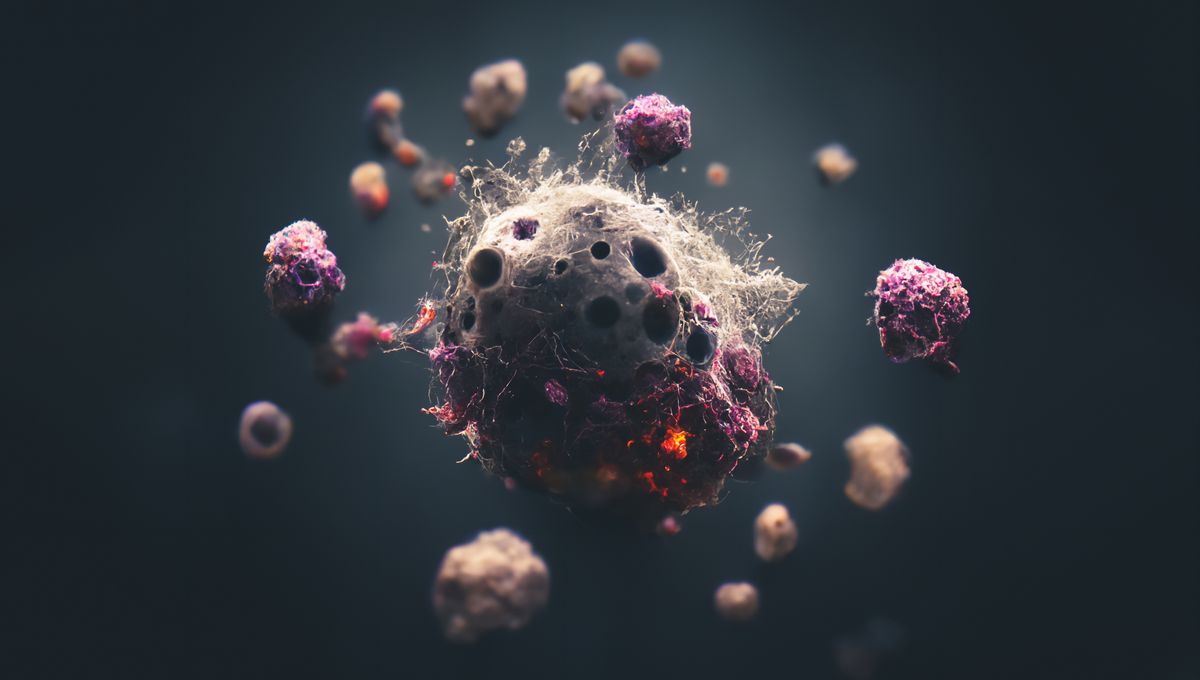
A nanoparticle vaccine has shown great promise in preventing three types of cancer in mice, as well as stopping tumors from spreading when they were exposed to cancerous cells.
Cancer vaccines have moved from the sci-fi dream realm into actual scientific possibility within just a few short decade. We’re not just talking about the HPV vaccine, incredible though its success has been at preventing cases of cervical cancer. A vaccine against a virus, albeit one that causes cancer, is easier to conceptualize – we get vaccinated against tons of other viruses, after all.
But vaccinating against a non-infectious disease like cancer, with all its complex causes and different presentations, is much harder to wrap your head around – making this latest study perhaps even more impressive.
Researchers led by a team at the University of Massachusetts Amherst have developed a nanoparticle-based vaccine that has previously been shown to shrink and clear cancerous tumors in mice. Now, they’ve demonstrated it can also work to prevent three types of cancer: pancreatic cancer, melanoma, and triple-negative breast cancer.
Regardless of the type of vaccine, you need two key components: something to kick the immune system into gear, called the adjuvant, and the thing that you want the immune system to respond to, called the antigen.
In a flu vaccine, you would include parts of inactivated flu viruses. The COVID-19 mRNA vaccines worked slightly differently, containing genetic instructions for the body to temporarily make its own copies of the virus’s spike protein for the immune system to react to.
The team tried their nanoparticle vaccine with a few different cancer antigens; but crucially, it is also set apart by its “super-adjuvant”, which has been formulated to provoke different types of immune responses.
The team first tested the nanoparticle platform with a well-characterized melanoma antigen, before exposing the mice three weeks later to melanoma cells. All of the unvaccinated or control vaccinated mice succumbed to cancer within 35 days. By contrast, 80 percent of those vaccinated with the new system remained tumor free until the end of the study (250 days).
Repeating the test for other cancer types, the team used tumor lysate – killed cancer cells extracted from an active tumor – as the antigen. As before, the mice were subsequently exposed to melanoma, pancreatic ductal adenocarcinoma, or triple-negative breast cancer cells.
Again, the majority of the vaccinated mice did not develop tumors: 88 percent for pancreatic cancer, 75 percent for breast cancer, and 69 percent for melanoma.
“By engineering these nanoparticles to activate the immune system via multi-pathway activation that combines with cancer-specific antigens, we can prevent tumor growth with remarkable survival rates,” said corresponding author Prabhani Atukorale in a statement.
First author Griffin Kane added, “The tumor-specific T-cell responses that we are able to generate – that is really the key behind the survival benefit.”
That’s all down to the “super-adjuvant”. Essentially, the team found a way to engineer their nanoparticles to deliver two adjuvants at once, as well as the antigen.
“There is really intense immune activation when you treat innate immune cells with this formulation, which triggers these cells to present antigens and prime tumor-killing T cells,” Kane explained.
“In recent years, we have come to understand how important the selection of the adjuvant is because it drives the second signal that is needed for the correct priming of T and B cells,” said Atukorale.
As well as preventing tumors from forming, the type of immunity induced by this vaccine also shows promise in stopping metastasis – the way cancers spread to different regions in the body.
“Metastases across the board is the highest hurdle for cancer. The vast majority of tumor mortality is still due to metastases, and it almost trumps us working in difficult-to-reach cancers, such as melanoma and pancreatic cancer,” said Atukorale.
With the super-adjuvanted vaccines, she explained, you can achieve “memory immunity”. “We have memory systemically, which is very important. The immune system spans the entire geography of the body.”
The team are hopeful that their platform can now be further developed to produced preventative and therapeutic vaccines for multiple different types of cancer, work that has already begun with the founding of a startup called NanoVax Therapeutics.
“This is a platform that Prabhani developed,” said Kane. “The startup lets us pursue these translational efforts with the ultimate goal of improving patients’ lives.”
The study is published in the journal Cell Reports Medicine.
Source Link: Experimental Nanoparticle “Super-Vaccines” Stop Breast, Pancreatic, And Skin Cancers In Their Tracks